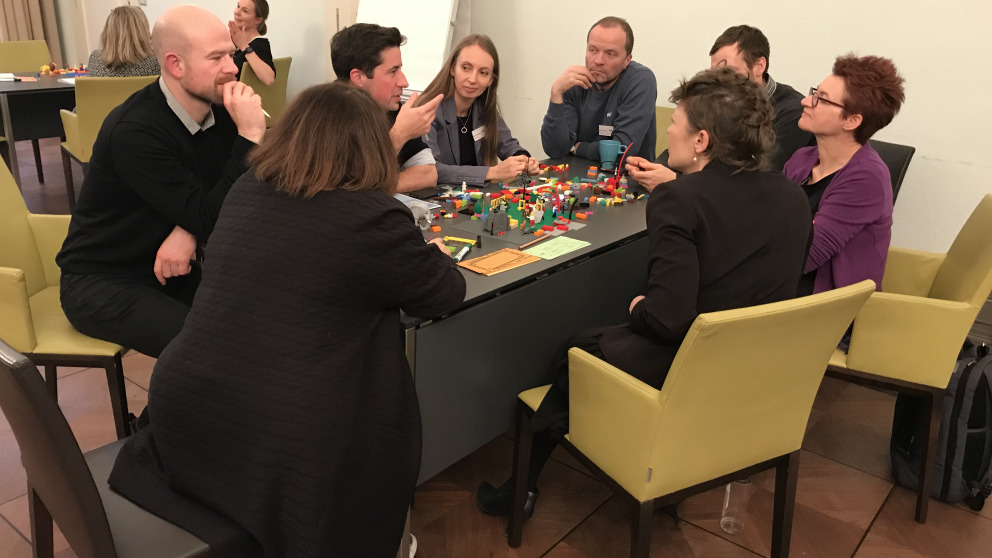Sustainability and Democracy: Exploring the Power of Labs
18.12.2019
Modern times are characterised by an increase in “wicked problems” that threaten established forms of democratic governability. What can labs – collaborative spaces for testing innovative ideas – contribute to democratic innovation and sustainability in government? In the workshop “Toward Democratic Transformation: A Lab on Labs” at the IASS, international practitioners, leading researchers and government experts explored lab methods and principles to promote democracy and sustainability. Their discussions resulted in early prototypes for labs that can help to address current sustainability challenges.

“For this workshop, we want to understand ‘lab’ very broadly, as designing and facilitating processes with the intention to support multi-stakeholder collaboration and participation in addressing complex social problems,” explained IASS Director Patrizia Nanz. The challenge to be discussed was framed as “sustainability by design in a democratic manner”. Sustainability by design was characterised along three dimensions: sustainability as a response to environmental problems and societal challenges such as climate change and threats to democracy; sustainability as a normative orientation towards certain values such as justice and freedom; and sustainability by design as an intentional intervention.
The lab first engaged in mapping international experiences with four different labs:
- The Transformation Lab, Mexico, aims to create a coherent collective strategy to address urbanisation impacts on the Xochimilco urban wetland in Mexico City. The purpose of the lab is to identify individual agency in order to foster collective agency. It follows the principle of reframing systems by means of common values and emotions.
- The CitiLab, Spain, aims to democratise innovation and include various people, regardless of race, gender, and social or cultural background. Projects are designed based on needs and follow the principle of “head, heart, hands-on”.
- The GovLabAustria aims to test how expertise from politics, administration, science, industry and civil society can be brought together and incorporated into legislative processes. It applies the principles of co-working, co-creating, and rapid prototyping.
- The Real World Labs, Germany, seeks to initiate societal transformation and sustainable development in areas such as mobility, tourism, planning, energy, and the integration of refugees. It is designed as a real-world experiment.
The discussion of international experiences inspired the design of lab prototypes. Rebecca Freeth and David Winter (Reos Partners) facilitated the lab and prototyping process. The participants developed lab models that focused on socio-ecological change in the Amazon region, inclusiveness in lab formats, the implementation of the Sustainable Development Goals in Germany, criteria for an impactful lab design in public administration, and “one-stop shops” to guide administrative staff through the process of organising labs.
The participants took away some key insights from the discussions and prototyping exercise to further dialogue about labs:
- Labs provide a playful space to experiment, experience and learn.
- Labs have very different purposes and rationales, which makes it a challenge to define and conceptualise them. Some labs aim to enhance political decision-making and public-sector services by fostering values such as legitimacy and knowledge integration. Others seek to enhance individual and collective agency for political decision-making or social, ecological and economic sustainability at grassroots level.
- Labs should be thought of as a set of behaviours and a mindset, and as ways of working.
- Context matters for the purpose of labs, how they are set up and the kind of impact they can have. They usually emerge in response to a political need and often rely on external funding structures and political sponsorship.
The IASS research project Democratic (Re)configurations of Sustainability Transformations will share the results of the workshop in various publications about labs, including a journal article that discusses the potential of labs as democratic innovations and their wider democratic implications. Participants will continue to collaborate on potential lab formats for specific contexts, for example socio-ecological change in the Amazon region and sustainability in both the German government and at the science-policy interface.



